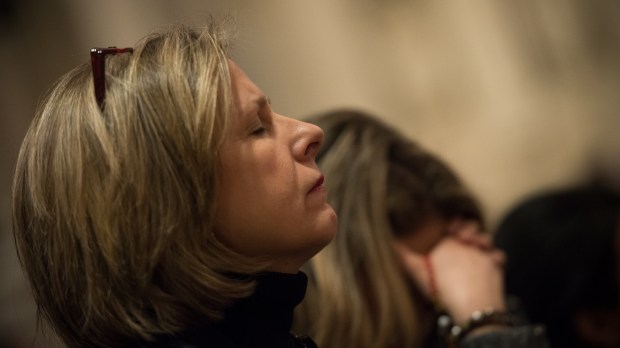God speaks to us all the time, usually indirectly. But sometimes he speaks plainly and unmistakably. I have experienced this more than once, and I especially remember one instance that changed the course of my life at age 16.
Don’t get me wrong. The indirect ways God speaks are powerful enough.
Once you know where to listen, you will hear God’s voice echoing everywhere.
God speaks in Scripture, which is far deeper and more personal than your best friends’ social media posts. When you are reading the Bible and get an insight that floods a corner of your world with light, that’s God. He has changed many lives this way.
God speaks in the teachings of the Church, which are far clearer and more comprehensive than the lessons of personal experience, because they represent generations of saints’ wisdom, guided by the Holy Spirit. When Church teaching suddenly makes a confusing and troubling issue understandable and hopeful, that’s God.
God speaks to you through creation. When the beauty that surrounds you makes you grateful, when the order of the universe fills you with confidence, when all the material goods you receive humble you, that’s God showing you that he has built his beauty, truth, and goodness into everything.
You can hear him there at all times. But sometimes you get to hear something more.
I was 16 years old when he came to me, unasked, and changed my life. I didn’t see any visions, feel a physical sensation, or hear an audible voice, but I remember it vividly, and it was unmistakably him.
I was on the porch swing at the back of our house, trying to decide where I stood on the abortion question. I had convinced myself that the compassionate thing to do was to accept that a woman in a difficult situation can do as she chooses. But the humanity of the unborn child kept stopping the thought.
“Who am I to say what is right and what is wrong for her?” I thought. “I can’t know what’s right or wrong.”
But suddenly, my mind was seized by a series of thoughts — it’s hard to describe the power of it — in which I was brought to explore the consequences of this “I can’t say what is right or wrong.”
If that were true, then how can I say that racism is wrong? How can I say that the Ku Klux Klan is wrong? How can I say that Nazism is wrong? How can I say that slavery is wrong? How can I say that anything is wrong?
Then it suddenly occurred to me: Good people in all times and places had stepped forward to decry what is wrong. On what authority, I asked? The answer came: God’s!
There must be a God, I suddenly realized, and he must have some connection to morality.
I know it was something besides me, because I pushed back. No, no, no, I answered. I had already decided that God isn’t necessarily true; I had in fact already decided that he either doesn’t exist or he has made his existence so obscure that it could hardly matter.
But then more thoughts seized me: So many great authors I admired all believed in God. Were they naïve? Thoughtless? Certainly not. Could they all be wrong?
I thought of specific people who I admired who must be wrong if there is not God: First, I thought of my mom, who for years brought me along to drop off “donations for unwed mothers” at our church. Why should she bother?
But then I thought about my grandfather Juan, who I admired more than anyone else on earth, then Martin Luther King Jr., Abraham Lincoln, Mother Teresa, saints, explorers … a whole line of wise men and women who I had never paid much attention to were presented to me. I felt the question put to me: So, you’re right and they’re wrong?
How am I so certain it was God’s voice?
At the time, I just knew. But now I can see that the experience passed St. Ignatius’ rules for discernment. It increased my love for innocence, my humility, and my desire to sacrifice for what’s right. It brought profound joy instead of pleasure at others’ expense, it brought concern instead of bitterness, generosity instead of selfishness, and patient firmness instead of anxious urgency.
It simultaneously increased my compassion for women in trouble and their children — and it simultaneously made me feel more certain than ever before and more open-minded.
I had drawn two conclusions by the end of the experience, whatever it was.
There had to be a God, and there had to be some way of calling some things wrong and some things right.
I didn’t yet accept that Jesus Christ was the Meaning of the Universe and certainly didn’t consider the Church his instrument. But my mind was open for the first time in a long time.
Do you need to hear God’s voice?
Ask him to speak! Then, look in the usual places. Last, be still and quiet and listen for his unmistakable voice.


